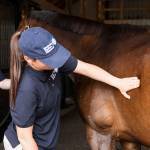Owner Survey Identifies Barriers to Battling Excess Condition in Horses

A recent survey of Irish horse owners found that nearly 45% of horses and ponies were overconditioned, making excess body fat a “significant problem in this population.”* Although many owners reported they were aware of body condition issues and felt “in control” of their horse’s condition, only a quarter of owners regularly monitored condition.
After interviewing 60 owners and having them use the Henneke body condition score (BCS) chart, here’s what the researchers learned.
- The Henneke body condition score scale is “too technical.”
Owners had only fair ability to accurately judge their horse’s BCS, even after receiving specific instructions on using the Henneke scale. Owners of overweight horses (i.e., those with a BCS of 7 or more) frequently underestimated body condition. Some owners were unfamiliar with the body parts being referenced, specifically the tailhead, hook bones (points of hip), and loins. Further, survey participants said the descriptions of different scores were too similar.
- Owners failed to pick up the right tools.
Only six owners reported using a weight tape on their horses, and only three out of eight owners with access to a scale used it. Most survey participants did not use any specific means of monitoring weight or body condition. However, 62% of all owners indicated they noted changes in their horses’ condition, with most owners evaluating their horses’ bellies. The belly, however, is not one of the body parts used to evaluate BCS on the Henneke scale.
- An “obesogenic” environment may be an influential factor.
Where an owner keeps his horse might also affect the horse’s body condition. An environment that tends to cause obesity—an obesogenic environment—includes physical and social considerations. Are the horses turned out on grass? Can grazing muzzles be placed prior to turnout? Who is responsible for feeding the horse if not the owner?
Highlighting the social effect, one of the larger yards included in this study had few overweight horses, and horses were primarily used in high-level competition. However, in another large yard, the horses were used recreationally, and two-thirds of the horses were overconditioned. This may, however, be a confounding factor in the survey as the environment was assessed in only three yards.
Previous studies have noted that peer pressure can influence how other owners address adiposity, weight loss, and nutrition.
Weight-Loss Tips
“Health risks are associated with excess body fat, such as insulin dysregulation and laminitis, so it’s important for horse owners to understand optimal body weight,” said Ashley Fowler, Ph.D., an equine nutritionist for Kentucky Equine Research. “Because many owners find the subjective BSC system difficult to use and often underestimate their horse’s body condition, more education on the use of the system and improved scoring descriptions may be helpful. Alternatively, perhaps more objective scoring systems for body fat need to be developed.”
For horses that need to lose weight, owners should embrace reducing caloric intake, increasing exercise, or both. Reducing caloric intake can be accomplished by decreasing the amount of grain or concentrates, restricting hay intake, or using a grazing muzzle if the horse is turned out on pasture.
“If fortified concentrates are removed from the diet, make sure to add a low-intake ration balancer or a vitamin and mineral supplement to meet your horse’s nutrient requirements,” advised Fowler. This is particularly true when soaking your horse’s hay.
Kentucky Equine Research has collected several body condition resources in one fact-filled place. Check it out now!
*Golding E., A.S.A. Al Ansari, G.A. Sutton, N. Walshe, and V. Duggan. 2023. Rate of obesity within a mixed-breed group of horses in Ireland and their owners’ perceptions of body condition and useability of an equine body condition scoring scale. Irish Veterinary Journal 76(1):9.








